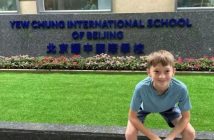Qingming Uncovered
Spring traditions old and new
 Qingming (清明) Festival, also known as Tomb-Sweeping Day, is one of the most important traditional Chinese holidays, a time when families gather and visit the graves of their ancestors. The history of Qingming can be traced back to the Zhou Dynasty (c. 1046-221 BCE). The festival originally represented the arrival of warm weather, the blossoming of flowers, and a time for new planting.
Qingming (清明) Festival, also known as Tomb-Sweeping Day, is one of the most important traditional Chinese holidays, a time when families gather and visit the graves of their ancestors. The history of Qingming can be traced back to the Zhou Dynasty (c. 1046-221 BCE). The festival originally represented the arrival of warm weather, the blossoming of flowers, and a time for new planting.
You may wonder how this celebration of warm weather became a tomb-sweeping festival. During the Zhou Dynasty, Emperor Wen selected a date close to Qingming to honor the memory of a loyal minister through tomb-sweeping. On that occasion, people mourned the minister by refraining from eating hot things or building fires; thus the day was called Hanshi (寒食) Festival, meaning “eating cold food.” By the seventh century AD, Hanshi and Qingming had merged into one festival.
Qingming’s traditions have included playing polo, ancient soccer, flying kites, playing on swings, taking day trips with family, and of course, eating cold dishes and tomb-sweeping. It may seem strange to take part in physical activities while mourning, but there’s a rationale behind the practice. Cold food is thought to weaken the body and exercising prevents people from getting sick.
Although most of these traditions have been abandoned, in some parts of China, people still eat cold food on Qingming. Generally, tomb-sweeping, flying kites and outdoor excursions are the only Qingming traditions Beijingers partake in. People typically visit their ancestors’ graves and mourn with their families. After that, they picnic or take a walk in the park. Because many cemeteries are in the countryside and have beautiful scenery, it’s easy to find a destination for a spring outing.
Last year, the Chinese government finally made Qingming an official holiday; everyone in the country now gets the day off. In the spirit of Qingming, as the Chinese phrase goes, “Let the dead rest in peace and the living stand strong” (愿逝者安息,生者坚强). Jackie Yu



